The Bridge Blog
A dialog about our new bridge and these web pages
Overview. As a pointy-headed
university professor, my weekend project of bridge photography and
building these web pages generated many questions and introduced me
to just-in-time learning. I enjoy chasing my curiosity and
want to identify ways to encourage younger learners to also enjoy curiosity
chasing and learning.
Learning usually requires repetition while forgetting occurs when
I infrequently use information. Many young learners do not understand
the importance of repetition. Weekly visits to the bridge provided
the repetition necessary to detect changes in the bridge and
consequently generated
many questions and opportunities for learning. Over the course of the
bridge project, I had access to few experts for answering questions.
Rather than a liability, this became an asset and pushed me to improve
my search skills with Google. Soon, I found that answers
to questions encountered during my weekly photo shoots were often
only a Google-search away -
(see
Restoring the Joy in Learning). Consequently Google + Internet became
dependable extensions of my memory.
The bridge story is a work in progress and is evolving from a simple
collections of photographs to an experiment with Internet-centric
just-in-time learning.
Insights I gain from you
will find their way into the learning centers of MUSC.
Palmetto Bridge Constructors, a joint venture between
Tidewater
Skanska and
Flatiron Constructors, as well as
High Steel Structures,
Freyssinet, the
SCDOT and the
Federal Highway Commission Office
of Bridge Technology guided much of my learning.
I also learn from many of you and from Google-linked resources. More
important is the e-mail encouragement I receive from many of you.
Thu, 21 Jul 2005
July 21, 2005: Transition from building to unbuilding
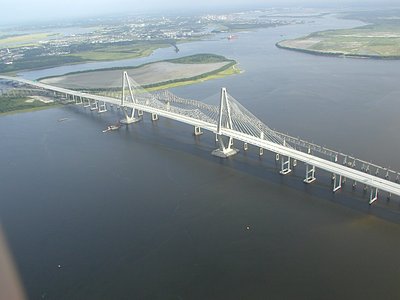
The construction of the new Cooper River Bridge is complete. The
fireworks and opening ceremony, from my perspective, breathed new
life into our community. Certainly use of the bicycle
and pedestrian walkway during the first days demonstrated both their
utility and the vision of the bridge sponsors.
There is a first chapter and a last chapter with every story and
our bridges are no different. I have started preparations for
keeping our stories alive, now as historical documents. As a
first step, I am moving the Internet address of the Ravenel Bridge story to
http://ravenelbridge.net. This
will provide a stable location and facilitate transition of the site
to a future home, perhaps the Charleston Public Library or the
Historical Society. I have not explored this with any agency, but it
seems to me that our web site (yes, not mine) would be better preserved
under the leadership of a public agency.
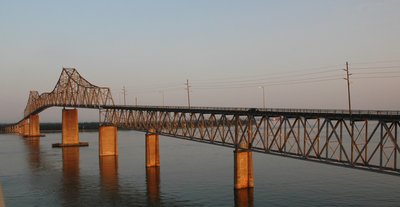
Yesterday I started the first chapter of the unbuilding of the
Grace and Pearman bridges. I have moved the Internet address for
our new story to
http://oldcooperriverbridge.org. I shall continue to take
weekly, and in some cases, daily (early morning and late afternoon)
photos of the Charleston approaches, Mt. Pleasant approaches and
the main bridge spans. In addition, I will build a new section
addressing engineering issues and insights, similar to the
Engineering and
Close-ups section I developed around the construction of the
Ravenel bridge.
Many of you have fed me ideas and questions. As we start our new
story, please continue to write me. Let our learning continue!.
posted at: 03:45 | path: | permanent link to this entry
Sun, 17 Jul 2005
July 16, 2005: The meaning of a signature bridge
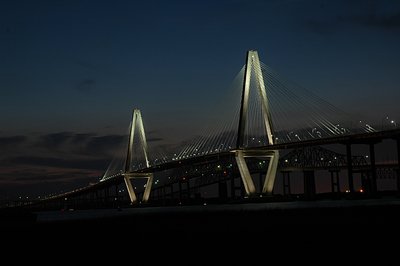 From Walter Baker in California:
From Walter Baker in California:
I saw a news article on
the opening of the Arthur Ravenel Bridge. I put its name in a search engine
and fortunately found my way to your website. I became wonderfully
distracted by your photographic documentation of the bridge construction. I
want to thank you so much for the time and effort you put into this project.
You live in a beautiful area of our great country and now it has been
crowned by a wonderful work of art. I offer you the following.
Easy it is to be cynical,
In the days in which we live,
But every now and then,
A ray illuminates the darkness
And spans the gap to heal.
A sense of unity once thought lost
Found on the other shore,
And brought home to rest
In the warmest place once more.
There will be times when this is forgotten
And all the worlds in a rage,
But from a distance its image shines,
The crossing place forever in the mind.
W Baker
posted at: 05:31 | path:
|
permanent link to this entry
Sat, 16 Jul 2005
July 16, 2005: The meaning of a signature bridge
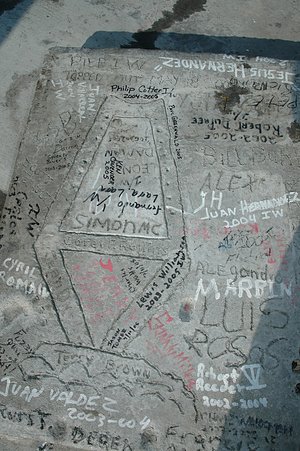 Yesterday, Vince Streano, David Wertz and I revisited the top of the
west tower. It was almost 1 year ago (July 21, 2004) that David and
I visited the top of the west tower - at that time looking at a number of
bridge engineering issues. Among them was the cabling process managed
by Olivier Forget from Freyssinet
- and the time was near the end of "le Tour de France". During an
earlier visit to the top of the west tower, I noticed a concrete tablet
on the floor (upper left) with the names of many of the construction
workers. Dumb Frank did not record this photographically at the time. This
time I was not going to repeat the same mistake twice. Not only did I take
several photos of the tablet, but I found Philip Cotter's and Lewis
Williamson's names on the tablet. Philip and Lewis are iron workers, a
very special breed of man that suspended themselves while erecting
edge and floor girders and placing the concrete floor panels. Philip's wife,
Tina, exchanged a number of emails with me about Philip and his
artistic and literary skill - naming the last main-span crane (east side)
the "Last Dinosaur Standing" (see
for the dinosaur story).
Yesterday, Vince Streano, David Wertz and I revisited the top of the
west tower. It was almost 1 year ago (July 21, 2004) that David and
I visited the top of the west tower - at that time looking at a number of
bridge engineering issues. Among them was the cabling process managed
by Olivier Forget from Freyssinet
- and the time was near the end of "le Tour de France". During an
earlier visit to the top of the west tower, I noticed a concrete tablet
on the floor (upper left) with the names of many of the construction
workers. Dumb Frank did not record this photographically at the time. This
time I was not going to repeat the same mistake twice. Not only did I take
several photos of the tablet, but I found Philip Cotter's and Lewis
Williamson's names on the tablet. Philip and Lewis are iron workers, a
very special breed of man that suspended themselves while erecting
edge and floor girders and placing the concrete floor panels. Philip's wife,
Tina, exchanged a number of emails with me about Philip and his
artistic and literary skill - naming the last main-span crane (east side)
the "Last Dinosaur Standing" (see
for the dinosaur story).
Here, permanently placed on the top of the west tower is a symbol of the
worker's bride. Many signatures are absent - but the pride runs all the
way from Bobby Clair through Wade, Peo, Marvin, David and Olivier all the
way to me - as these folks opened doors that enabled me to bring to you
much of the untold stories behind building our Arthur Ravenel Jr. Bridge.
And a final note about the Internet and learning. The Internet provided
me a medium that enabled me to share with you what the bridge folks shared
with me. Not only that, the Internet provided a communication medium that
linked me with Bill Mankin at High Steel, with engineers at the Federal
Highway Administration, Bridge Division, with Buckland and Taylor,
T. Y. Lin, HDR, Freyssinet and Tidewater Skanska. Governor Sanford
and Bob O'Brien even provided input. In the end, Bob has suggested
that I explore transfering
this web site to the Historical Society or the Library -
a wonderful strategy for breathing new life into these pages.
So from me - smiles and a big thank you to all of you!
Frank Starmer, Medical University of South Carolina.
posted at: 12:02 | path: | permanent link to this entry
Mon, 04 Jul 2005
July 4, 2005:
Le Tour de France and our International Family
The 2005 Map of Le Tour de France: A one year anniversary of close encounters with bridge builders:
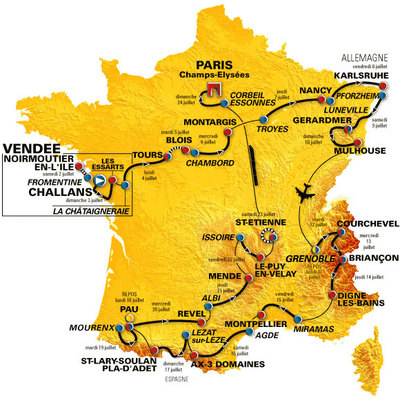
Almost a year ago (July 21, 2004),
David Wurtz gave me my first bridge building seminar on the
platform of the
west span. As part of our seminar we made a visit to one of
the cable construction stations in
the interior of the west pylon which is how I discovered Freyssinet.
Later Olivier Forget, the leader of the international
Freyssinet team, as well as
Eduardo, Cyril, Jose, Pavil, Bruno, Philiu and Niko joined our seminar and helped me
to understand the design, construction and testing of stay cables.
Now, a year later, the Tour de France has just started and I am
remembering the excitement of my first visit to the main span. Wade,
Peo, Marvin, Brian, Lori, Wilbur, Derik and many many others gave
these pages a bit of life. Thanks to all of them!
posted at: 10:00 | path:
|
permanent link to this entry